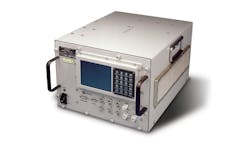BAE Systems to redesign Navy VME-based AN/UPX-50(C) transponder interrogator to stave-off obsolescence
PATUXENT RIVER NAS, Md. – Shipboard- and land-based communications experts at BAE Systems will redesign U.S. Navy transponder interrogators to resolve parts obsolescence issues and to integrate additional processing capability under terms of a $24.9 million order announced Friday.
Officials of the Naval Air Systems Command at Patuxent River Naval Air Station, Md., are asking the BAE Systems Electronic Systems segment in Greenlawn, N.Y., to add processing and mitigate parts obsolescence in the Navy's the AN/UPX-50(C) digital interrogator for the Navy and U.S. Coast Guard.
Navy experts are asking BAE Systems to redesign the AN/UPX-50(C) to comply with the latest specifications, qualifications, and certification standards for the Navy, as well as integrate target report processing capabilities formerly hosted in the AN/UPX-24(V) interrogator set.
The AN/UPX-50(C) digital identification-friend-or-foe (IFF) interrogator is the Navy's upgraded Mode 5 land level 2 and Mode S interrogator. It is a tech refresh upgrade to the Navy's AN/UPX-41(C) and AN/UPX-45(C) IFF interrogators.
The IFF transponder interrogator is part of the Mark XII and Mark XIIA IFF interrogator processing system. It includes Mode 5 and Mode S, and adds a third receive channel for passive acquisition of Mode 5 Level 2 and ADS-B In.
The Mark XIIA IFF interrogator is for naval and land-based air defense, and conforms to U.S. military, NATO, ICAO, and U.S. FAA airborne surveillance, and air traffic control standards.
Its modular and digital architecture accommodates customized configurations for air defense, weapon systems, air traffic control, and range instrumentation.
The interrogator can generate digital target reports, wideband video for passive and active decoding, and provides amplitude monopulse for improved azimuth accuracy over conventional systems. It operates autonomously, or with a host radar.
The AN/UPX-50(C) digital IFF interrogator is based on the VME circuit card and backplane embedded computing design standard, uses embedded M5 NSA certified cryptography, offers built-in test, and offers growth for a target data extractor.
The interrogator can operate at altitudes to 12,000 feet in temperatures from -28 to 65 degrees Celsius. It meets MIL-S-901D for shock and vibration, exposure to salt fog and humidity, and meets MIL-STD-461D electromagnetic compatibility.
For more information contact BAE Systems Electronic Systems online at www.baesystems.com/en-us/our-company/inc-businesses/electronic-systems, or Naval Air Systems Command at www.navair.navy.mil.
